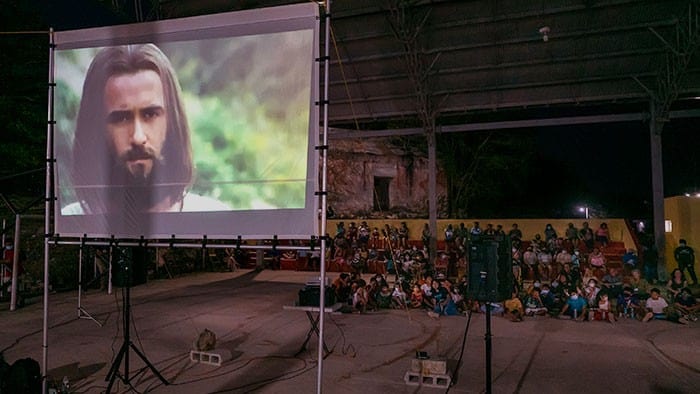When Jesus gave the church the Great Commission, this came with the task of overcoming the language barriers that existed for different people groups. We see the Spirit tackling this initial hurdle with the gift of tongues at Pentecost when people from all over the world heard the disciples “declaring the wonders of God” in their own languages (Acts 2:5–12).
The JESUS film is another tool that the Lord has been able to use to significant effect. Since 1979, the film has been translated into over 1,950 languages, and Guinness World Records has recognized it as the “Most Translated Film” in history.
This means that through partnerships with more than 1,800 ministries, the JESUS film (an adaptation of Luke’s Gospel) has been viewed around the world. And more than 500 million individuals have indicated decisions to follow Jesus after seeing the film.
The importance of heart language
If you’ve spent time around anyone connected to Jesus Film Project®, you’ve heard the term “heart language.” This critical term is the secret sauce in Jesus Film Project’s vision. Heart language represents the language that someone has grown up hearing every day. They may know multiple languages, but heart language is the one that reminds them of home.
Through JESUS and our other films, people are exposed to the story of Jesus in their own heart language. This is especially remarkable when you consider that there are many times when the film is shared with people who are largely illiterate or have no written language, and this is their first and only exposure to Scripture.
Seeing a representation of Jesus on screen and hearing Him speak to them in their own heart language is dramatic and powerful.
The work of translation, recording, and mastering
Translation is such a critical part of the work of Jesus Film Project. The excitement that goes into adapting the film into a new language is almost unexplainable. It ensures that a whole new people group will experience Jesus for the first time.
So how does the process work? It’s broken into these stages:
- Research
During this stage, we’re working alongside Bible translators and partners to survey languages used by groups that lack a translation of the JESUS film (and other Jesus Film Project films). - Translation
When a new language is chosen, we find a language speaker who can skillfully translate the script. If it’s not a written language, we find someone who can record an audio translation of the script. - Recording
Once we have an updated script, we bring in local language speakers to serve as voice actors for the 21 different roles. These actors either work from the translated script, or they listen to the recorded translation and re-record it dramatically. - Editing and Mixing
Experts then take the voice actors’ recordings, balance out the tracks, and add sound effects and music, paying particular attention to matching the dialogue with the film. Meanwhile, a committee of native speakers and scholars listen to the dialogue for accuracy and clarity. - Mastering
A final master recording is produced as well as an original version that enables duplication. It can be modified for any viewing application, tablet, phone, or projector.
Our partnership with countless individuals and organizations helps complete this work of allowing people to hear Jesus in their heart languages. These partnerships extend Jesus Film Project’s reach, and enable us to reach remote people groups who might otherwise never hear the good news.
This whole process is possible because of people around the world who share our commitment to fulfilling the Great Commission supporting the work of Jesus Film Project through prayer and financial gifts!
Take our resources with you!
The JESUS film (along with hundreds of feature-length and short films) are available for you to use in sharing the gospel, too! With the Jesus Film Project app, you can share your faith with friends, family, neighbors, and co-workers—and they can hear this life-changing message in their own heart language!
